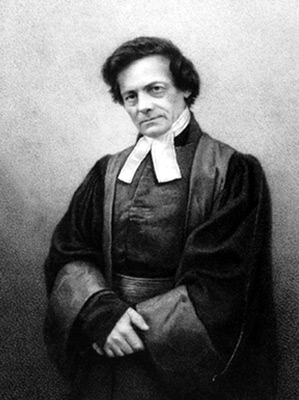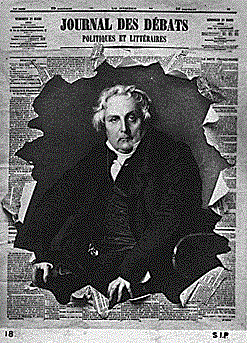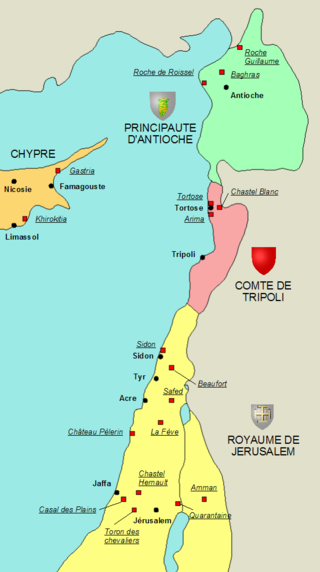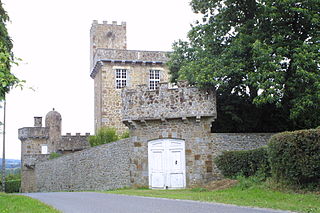
François Pierre Guillaume Guizot was a French historian, orator, and statesman. Guizot was a dominant figure in French politics prior to the Revolution of 1848.

Adolphe-Louis-Frédéric-Théodore Monod was a French Protestant churchman. His elder brother was Frédéric Monod.

The July Monarchy, officially the Kingdom of France, was a liberal constitutional monarchy in France under Louis Philippe I, starting on 26 July 1830, with the July Revolution of 1830, and ending 23 February 1848, with the Revolution of 1848. It marks the end of the Bourbon Restoration (1814–1830). It began with the overthrow of the conservative government of Charles X, the last king of the main line House of Bourbon.
During the Bourbon Restoration (1814–1830) and the July Monarchy (1830–1848), the Doctrinals were a group of French royalists who hoped to reconcile the monarchy with the French Revolution and power with liberty. Headed by Royer-Collard, these liberal royalists were in favor of a constitutional monarchy, but with a heavily restricted census suffrage—Louis XVIII, who had been restored to the throne, had granted a Charter to the French with a Chamber of Peers and a Chamber of Deputies elected under tight electoral laws. The Doctrinaires were a centrist, as well as a conservative-liberal group, but at that time, liberal was considered to be the mainstream political left, so the group was considered a centre-left group.

The Journal des débats was a French newspaper, published between 1789 and 1944 that changed title several times. Created shortly after the first meeting of the Estates-General of 1789, it was, after the outbreak of the French Revolution, the exact record of the debates of the National Assembly, under the title Journal des Débats et des Décrets.

The Battle of Meung-sur-Loire took place on 15 June 1429. It was one of Joan of Arc's battles following relief of the siege at Orléans. This campaign was the second sustained French offensive in a generation in the Hundred Years' War.
Guillaume de Nangis, also known as William of Nangis, was a French chronicler.

La Roche-Guillaume was a medieval fortress of the Knights Templar located near the Syrian Gates in what is now the Hatay Province of Turkey.
Rodulf of Ivry was a Norman noble, and regent of Normandy during the minority of Richard II.

Sainte-Honorine-la-Guillaume is a commune in the Orne department in north-western France.

Guillaume Adam de Félice, 4th Comte de Panzutti (1803–1871) was a Savoy nobleman, theologian and abolitionist.

The Affair of the Spanish Marriages was a series of intrigues between France, Spain, and Great Britain relating to the marriages of Queen Isabella II of Spain and her sister the infanta Luisa Fernanda in 1846. Britain and France took opposing roles with British foreign minister Lord Palmerston as hostile to France. However, France was successful in promoting a French husband for the queen of Spain. The affair led to a deterioration of relations between France and Britain in the final years of the July Monarchy.
The Comité des travaux historiques et scientifiques (CTHS) is a French research institution created by the Minister of Public Education François Guizot on 18 July 1834 for the purpose of 'leading research and making available unpublished documents, with funds voted from the state budget." Its mission includes promoting the work of learned societies. It is currently affiliated to the École Nationale des Chartes. In 2017, its president was Maurice Hamon and its deputy head was Christophe Marion.
Henriette Guizot de Witt was a French writer who wrote under the name Mme de Witt, née Guizot.

Guillaume-Isidore Baron de Montbel was a French politician who was a mayor of Toulouse, a deputy and a minister in the French government during the last year of the Bourbon Restoration. He was an ardent royalist and opposed to the freedom of press. After the July Revolution of 1830 he was tried in absentia and sentenced to civil death. He was later pardoned and returned to France.
Events from the year 1590 in France

The Coppet group, also known as the Coppet circle, was an informal intellectual and literary gathering centred on Germaine de Staël during the time period between the establishment of the Napoleonic First Empire (1804) and the Bourbon Restoration of 1814–1815. The name comes from Coppet Castle in Switzerland.
Pauline de Witt was a French historian and translator.

Events from the year 1558 in France

Suzanne Rosette de Chabaud-Latour, known as Rosine de Chabaud-Latour, was a French religious thinker and translator. The daughter of an engineer who had served Napoleon, she was a prominent member of the protestant church in Nîmes and Paris. She translated the writing of English-speaking religious writers of the time, Thomas Adam, John Newton and William Romaine, into French, and her writing and thoughts were important to the development of protestant religious thinking in France during the Réveil. She was governess to François Guizot's children, including his daughter Henriette who later also became a writer and translator.













